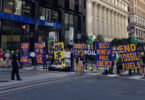Last Saturday was one of those days on the calendar that seems to magically attract all the cool happenings around town. Usually with multiple invitations on the same day you end up having to make some tough choices, but this time all the different events connected perfectly, not just timing-wise, but thematically.
In fact, there was a certain artistry and synergy in the sequence of the three places that were calling me that I couldn’t help but think of my day as a triptych, the 3-paneled format often used in photography, stringing together separate images that are variants on a theme.
Under the broader themes that could perhaps best be summed up as SOIL ∞ SOCIAL ∞ SURVIVAL, here’s my visual interpretation of the day, captioned by the event links, and some more thoughts and photos of the journey below.

The Great Compost Giveaway || “B” Socially Responsible || Climate Ride
First Frame: Soil

The Great Compost Giveaway – BYOB (Bring Your Own Bucket)
San Francisco, Calif., (April 6, 2013) – Today, Recology hosted the Great Compost Giveaway as a thank you to San Francisco residents for participating in the curbside compost collection program and for helping San Francisco move one step closer towards achieving Zero Waste by 2020. Drawing thousands of San Francisco residents, Recology handed out over 15 truckloads of nutrient-rich planting mix made from the City’s food scraps.
While I personally don’t have a garden to grow food in, I’m a big lover of all things soil and compost. It’s probably a combination of my seed trader ancestry, a deep interest in my city’s kickass zero waste initiative, the potential for compost not only to be the solution in restoring soil and agriculture but in sequestering carbon, as well as my artistic fascination with the underground as a metaphor for the human soul and the potential for transformation.

So when my city and its worker-owned (zero) waste management company Recology are hosting their annual compost fest where each resident gets 5 gallons of free gourmet planting soil made from their own food scraps, I have to be there just to see the joy of so many dots being connected.

Through the curbside compost collection program, residents have composted more than 1.2 million tons of food scraps, plant trimmings and other compostable materials, keeping the material out of landfill, reducing methane emissions, and returning nutrients to local farms. Used at more than 200 farms and vineyards throughout the Bay Area, SF compost is one of the most nutrient-rich soil amendments in the country due to its very diverse feed stock-rich food scraps.
I mean, just look at this stuff, it’s luscious and will put a smile on anyone’s face!

In some ways, the smile tells an even bigger story than the numbers. There is something about digging your hands in this luscious source of life that connects us on a deep level to who we truly are: parts of a magnificent interconnected organism rooted in an eternal web of give and take. We are in this together, and there’s something about your food scraps coming back in the form of plant nutrients that also brings us closer to each other and our community.

All in all, Recology volunteers handed out over 15 truckloads of compost at three locations throughout the city. Let’s just call it Soil Pride!

The spirit of camaraderie and community was the perfect energy to carry us into our next frame of the day…
Second Frame: Social

“B” Socially Responsible Conference
This year, i-Immersion, the B Lab, and Lokey GSB Net Impact Chapter at Mills College are co-hosting and recognizing the wide array of successful business enterprises that pride themselves in embracing the concept of “using the power of business to make a social change.” Come join over 200 Bay Area business professionals and students in the First Annual “B” Socially Responsible Conference as we explore prospects in the dynamic fields of technology, education, finance and community development.
No matter how hard I try to be a tree-hugging, lovey dovey ecomuse, every time I dig a little deeper into any given environmental issue, the ultimate obstacle in creating an ecologically balanced and sustainable solution almost always turns out to be the shortsightedness of capitalism as we know it and its soulless corporate entities whose only measure of success is quarterly profits.
For example, you wonder why it is that despite all the known benefits of urban composting, from restoring soils and boosting organic agriculture to reducing waste and methane emissions, the national composting rate in the U.S. for food scraps in 2010 was a dismal 3%. Well, the simple answer is that filling up landfills is the most profitable business from a short-term perspective. Just as Chevron and Exxon can continue to get filthy rich by burning every drop of oil they’re sitting on as quickly as possible, garbage giants like Waste Management Inc. make their biggest profit margins by throwing as much garbage in a hole in the ground as fast as they can.
In other words, if your only raison d’être is to maximize your shareholders’ quarterly profits, you’re going to indiscriminately throw everything in big, greenhouse gas-emitting piles until the whole damn planet looks like a scene out of Wall-E.

This is the reason why building a movement of companies whose mission is beyond their immediate bottom line is so crucial if we’d like to keep any hope of a livable planet for future generations. It’s why companies like Recology that are willing to make the long-term investments in state-of-the-art composting facilities and transition from being a garbage company to a resource recovery and waste zero company are so important, not only to reduce waste but to show that it can be done and pressure inspire others to follow suit.
Imagine if one of the big oil companies said,
“After careful consideration we have decided to shift from being an oil company to being an energy company. This is not only in the best long-term interest of our shareholders, but of all stakeholders, from land and people affected by ever more dangerous oil exploitation and communities affected by refinery pollution to life on earth itself that is increasingly endangered by climate disruption from CO2 emissions.”
That, in essence, is what B Corps are about, and the central theme at the “B” Socially Responsible Conference at Mills College was how companies and people can think bigger than this sidewalk stamp we found on our way to the Business Building…

Note: B Corp is a voluntary third-party assessment, like USDA Organic or Fair Trade, verifying a company’s social and environmental performance, transparency, and accountability on an ongoing basis. It is frequently confused with Benefit Corporation, a legal designation like C Corp or LLC that redefines a corporation’s modus operandi to include non-financial interests and relieves it of its obligation to maximize shareholder profits. They really embody the same spirit of creating a material positive impact on society and the environment, but Benefit Corp status legally relieves a company of its obligation to maximize shareholder profits. I wrote about Benefit Corp legislation in The Start of a Revolution and California’s New Triple Bottom Line.
There were a lot of great people and companies, from Ed Rainey of Back to the Roots urban mushroom farm and Carolyn McMaster of Thinkshift Communications (one of California’s first Benefit Corporations) to representatives from the nation’s fastest growing residential solar company, Sungevity.
The highlight was keynote speaker Gary Barker, founder of Ditto Sustainable Brand Solutions. Gary is the guy who came up with the brilliant cardboard hanger idea and has changed an entire industry in the process, from hangers as disposable commodities that clog up landfills to beautiful recyclable or compostable marketing tools.
Aside from being just an all around fun, smart and awesome dude, Gary has a gift of communicating why it is so important for manufacturers and businesses to think in whole systems and consider the entire life cycle of their product from beginning to end.
And before even getting to any product, Gary asked a question that could solve so many of the world’s problems if it were seriously explored by a majority of businesses and consumers…

Gary talked about how a growing world population and rising consumption are putting such stress on resources that we’ll soon be running out of many materials like precious metals, mining landfills because we’re so wasteful. With that knowledge, it was clear to him as a product designer that he had to think about end-of-life issues before ever picking up a pen, and that includes a trip to the landfill for all his employees. Bringing the question of what happens to a product after its use to the forefront completely reverses the design sequence.

As he was trying to convince big garment manufacturers like Nike, Disney, Adidas, and The Gap to change from their tried and true practice of using toxic and non-recyclable plastic hangers, Gary realized that he was reinventing the very meaning of “product.” Ditto Hangers weren’t just a commodity defying gravity, but powerful messengers speaking for the multi-faceted value inherent in their very design. It’s when he realized that he’d moved out of the hanger business to be a value company.
We’re not making things, we’re building values.
– Gary Barker.

That in a nutshell is who B Corps are and what they do: thinking outside your own little profit box to bring to light a whole range of other values that are eminently more meaningful to our existence and enjoyment as human beings on planet Earth.
Speaking of “existence” and “planet Earth,” this brings me to the third and final leg of the day…
Third Frame: Survival

Join us as we raise a glass and spin some vinyl to raise some funds for our ‘B the Change‘ cycling team who will be riding their bikes from the top of California down to San Francisco to support organizations fighting climate change.
It was only fitting that my day would culminate at an event directly addressing the threat of climate change, a “fun-raiser” for a 5-day Climate Ride down the California coast to raise funds for bike advocacy and organizations working toward a sustainable future. To me, climate change is a bit like the wholesale term embodying everything that is out of whack in our human thinking and manifest in our actions, including but not limited to the first two frames of the day.
In turn, I also think that there isn’t one big holy grail of a fix for climate change, but a whole host of solutions to be found in the social, economic, political, and conscious mosaic of our human interactions and aspirations. Put in the context of the first two frames on the triptych, if we can evolve our mental and physical relationship with the natural and material world, we’ll also be cooling the planet. If we can expand our very rigid and limited idea of economic success, we will need fewer fossil fuels to function and thrive.
Everything is connected, and the more people become conscious of this expansive web of cause and effect we find ourselves in, the quicker we’ll be able to build the kinds of systems that enable us to operate sustainably within its tapestry.
It struck me as quite symbolic then just how connected my evening was to my afternoon. It was, after all, Team B Lab, the non-profit that certifies B Corps, who was getting ready to pedal for a cooler planet and asking me to party down at Luscious Garage, a women-owned and operated auto care center for hybrids, and a Certified B Corp. After we got home from Mills College, I hopped on my bike and pedaled over to their SOMA location.
Of course, you’re now dying to see what a party at an auto shop that is also an art gallery, a classroom, and a community meeting space looks like…

Can’t go without some deep DJ beats and an interactive light show testing out for Burning Man 2013!

Steven Norman Long, whose beautiful voice I usually hear at the 24th St BART station, played an acoustic set…

Slide show in the corner between the VW vanagon and the old sports car…

As my B Lab connections Dermot Hikisch and Andy Fyfe described it perfectly in their invitation: “No speeches, heck no business cards, just good brew, cocktails, and music, with Bay Area B Corps and friends to gather for a good cause in a spectacular venue!”

Reprise
As daunting as the issue of climate change is, one may be tempted to question the seriousness of this kind of event. Like…
Shouldn’t there be gloomy speeches about how screwed we are?
The fact that you’re probably getting a good chuckle out of that line shows that deep down I think we all know we have to summon the courage to be full of joy, hope and compassion, no matter how difficult things might get. Not to build a wall of denial or to create a false sense of positivity, but because our very survival depends on whether we can find ways to work together more closely, to listen to one another, to be more connected to our surroundings, to help each other out, and to spread that sense of community and togetherness as widely as possible.
For just as the stored energy from million year-old fossils has afforded us unprecedented independence, it seems that the smartest strategy to thrive in a world of shrinking fossil fuels is the fearless and conscious practice of interdependence. And the only way you can build that kind of trust in each other is to dance, sing, and laugh together.
With that, here are my triptych conclusions:

- Fighting climate change is as much about learning to love and trust each other as it is about cutting carbon.
- B Corp certification is as much about shifting our collective values of what’s important as it is about scoring 80 points on the Impact Assessment.
- Composting gifts us more than good nutrients and less waste — it presents us with the opportunity to shake the hands that feed us.
That last one is exactly how I ended my night — with a slider and a chat at the Fuki food truck parked in front of the Luscious Garage.

o~O~o~O~o~O~o~O~o~
all photos by sven eberlein
As so often, much impetus and companionship provided by my partner-in-muse, Debra Baida.
crossposted at daily kos







